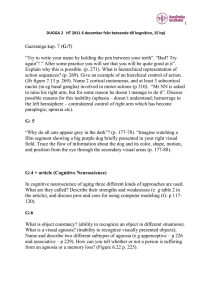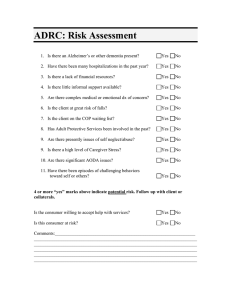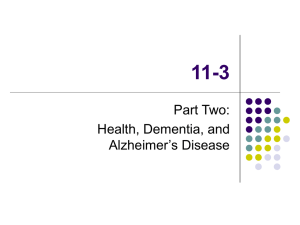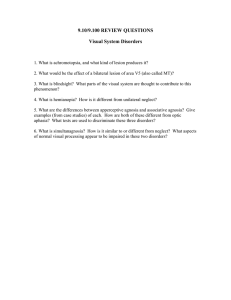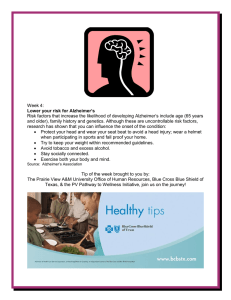• Dementia – Memory impairment (decline) – Other cognitive decline
advertisement
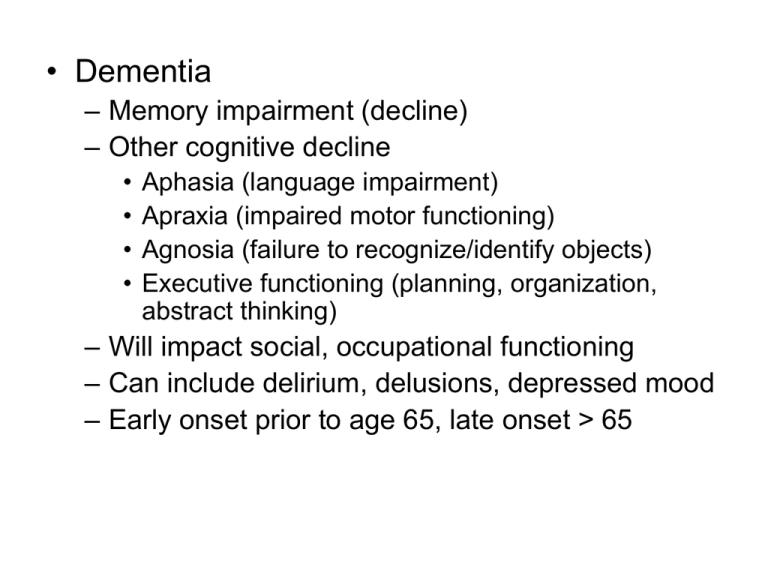
• Dementia – Memory impairment (decline) – Other cognitive decline • • • • Aphasia (language impairment) Apraxia (impaired motor functioning) Agnosia (failure to recognize/identify objects) Executive functioning (planning, organization, abstract thinking) – Will impact social, occupational functioning – Can include delirium, delusions, depressed mood – Early onset prior to age 65, late onset > 65 Causes of Dementia • Alzheimer’s (more details to follow) • Vascular: loss of blood supply & nutrients to the brain due to blockage or bleed – – – – Single large stroke Multiple small strokes (multi-infarct) Aneurysm Course can be sudden or “patchy” • Late-stage HIV • Head Trauma • Creutzfeldt-Jacob Disease (virus lies dormant then rapid progression/deterioration; similar to “mad-cow” disease) • Parkinson’s Disease • Huntington’s Disease Velma & Alzheimer’s • Multiple cognitive deficits manifested by: • Memory impairment – She is unlearning things, in roughly the same order that she learned them as a toddler – Mary Velma Connolly Buchanan is losing herself – Dolores Bordelon thinks that this is all about memory loss, and it’s not. It’s about personhood loss – Each new day was already a scary adventure for Velma. She already felt like a new kid at school, even in her own home, where you don’t know if you’ll be able to locate your classroom – Jeanne? Is anything wrong? Where are the babies? – My given name Jeanne might no longer come to her, but at such moments she could distinguish me from my father. – Velma no longer had any name for Rocky’s wife. • Deficits in one (or more): – Aphasia • I’d try to wake up, sit up, and explain things to her in simple and positive language. • Alzheimer’s prevented her from … making sense of what she heard. Her misinterpretation could lead to paranoia. • I knew that I should limit myself to short, declarative, positive sentences. • She had needs to satisfy, yet could not articulate them. • Right words would not come, and wrong ones would just pop up to take their places. She was embarrassed by this, and terribly frustrated. • Damn fick thapper, she muttered, floo thing! • VROOO! Mecklin barson! Saliva sprayed from the coral mouth. – Apraxia – Agnosia – Executive functioning • Deficits in one (or more): – Aphasia – Apraxia • She no longer knows how to button clothing. Brassieres are deep mysteries. • Mama no longer knew how to dial or even answer a telephone. • And then I’d hear it, that uncoordinated shuffling • Mama tried to feed herself ice cream with her spoon upside down • She once diapered me, now it’s my turn to diaper her. • She stopped bathing. Her clothes didn’t match. • Mama was folding towels … or trying to. She could not line up the corners. – Agnosia – Executive functioning • Deficits in one (or more): – Aphasia – Apraxia – Agnosia • Mama no longer understood what toilet tissue was for. She had stopped using it. • Mistakes a lipstick tube for her disposable lighter, and keeps trying to light her cigarette with it. • She asks you if the dirt white sock on the bathroom floor is a fried egg. • She was taking bites out of the kleenex. – Executive functioning • Deficits in one (or more): – Aphasia – Apraxia – Agnosia – Executive functioning • She could no longer follow her own train of thought • Mama did things that made no sense. She would turn on the electric burners of the stove for no reason • Now she’s starting to say somebody’s embezzling from us … You know, all that trash saying ‘You may have already won five million dollars ’ • She did things for no reason, prompted by nothing more than the misfiring of damaged neurons. • Velma wept frequently, not knowing why. Progression • Stage 1 (2-4 yrs): – Memory loss for: new information, recent events, routine tasks – Other Symptoms: occasional disorientation and impaired decision making abilities – Anxiety about symptoms, more reluctant to deal with others. • Stage 2 (2-10 yrs): – Memory loss for: words, friends or relatives; past events, very routine tasks (bathing or dressing). – No longer think logically. • Stage 3 (until death): – Memory loss for: day or month; familiar settings; spouse or children; how to feed or dress himself or herself. – Other symptoms: Wandering off, no longer be able to speak logical sentences. Complicating factors • Delirium: Impaired alertness & awareness (disorientation) along with cognitive deficits (e.g., memory, language) – Medical conditions (e.g.,hypoxia, hypoglycemia, electrolyte imbalance, liver or kidney disease, postseizure, head trauma) – Substance-Induced • Medications such as anesthetics, anticonvulsants, antihistamines, sedatives, etc. • Illegal drug use such as cocaine, cannabis, opioids Topics for Research • Resources in the area for caregivers • Compare symptoms with other types of dementia • Suspected biological causes of Alzheimer’s • Biological causes of other types of dementia • Treatments of Alzheimer’s and other dementias (could be combined with one of the above) • Famous people who developed Alzheimer’s (or other type of dementia)
